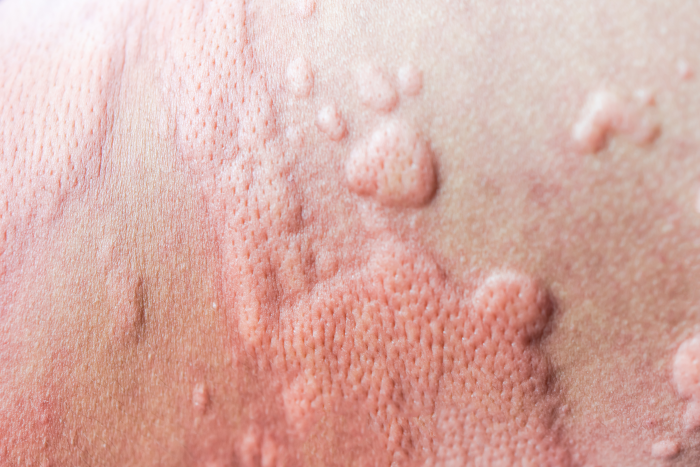Hives are not a very common skin condition. However, patients struggle to find effective treatments. We understand the frustration of dealing with hives. At the Trillium Clinic, our solutions are designed to address urticaria at its cause, helping your skin heal and giving you the clear, healthy, itch-free skin you desire. Begin your advanced urticaria treatments today, and say goodbye to the persistent itch and discomfort of hives.
What is Hives

Urticaria, commonly known as hives, is a skin condition characterized by raised, itchy, and often red welts or bumps on the skin. These welts can appear suddenly and may change shape, size, and location within minutes to hours. They may appear and disappear within a few hours or persist for several days.
What Causes Urticaria
Hives are typically caused by an allergic reaction, triggered by factors such as certain foods, medications, insect bites, pollen, or physical stimuli like pressure, water or temperature changes. It can also be caused by non-allergic factors, such as stress, infections, or autoimmune conditions.
How is Hives treated
Avoiding triggers: If a specific trigger is identified, avoiding it can help prevent or reduce the occurrence of urticaria outbreaks. Common triggers include certain foods, medications, insect bites, or exposure to heat or cold.
Lifestyle measures: Certain lifestyle measures can help manage urticaria, such as wearing loose-fitting clothing, avoiding hot baths or showers, using mild soaps, and keeping the skin moisturized.
Antihistamines: Antihistamines are the most common treatment for urticaria. They help relieve itching and reduce the release of histamine, which is a chemical that triggers allergic reactions. Antihistamines can be obtained over-the-counter or prescribed by a doctor, depending on the severity of the symptoms.
Corticosteroids: In severe cases of urticaria, corticosteroids may be prescribed. These medications help reduce inflammation and suppress the immune system’s response. However, they are usually reserved for short-term use due to potential side effects.
Other medications: In cases of chronic urticaria that are unresponsive to antihistamines, additional medications like omalizumab (an anti-IgE monoclonal antibody) or cyclosporine (an immunosuppressant) may be prescribed.
Embark on your journey to radiant skin
Urticaria treatment plans may vary depending on the severity of the condition and individual needs. We invite patients from Chapel Hill, Carrboro, Hillsborough, Pittsboro, Mebane, Durham, Burlington, Cary, and surrounding cities, who suffer from hives, to schedule an appointment with us here. We will conduct a comprehensive evaluation and explore the various treatment options in order to create an urticaria treatment plan that is best suited for your specific situation.

